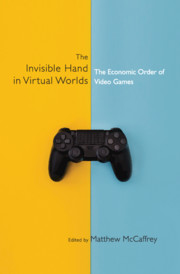Book contents
- Frontmatter
- Contents
- Introduction
- 1 The Economic Meaning of Play: Ludology and Praxeology in Video Game Worlds
- 2 Spontaneous Order and Video Game Narrative
- 3 Law and Economics in a World of Dragons
- 4 Minerals, Titans, and Connections: The Political Economy of Empire in the World of EVE Online
- 5 The Origins of Money in Diablo II
- 6 A Virtual Weimar: Hyperinflation in Diablo III
- 7 The Facilitate or Acquire Decision: The Tipping Points for Strategies toward User-Generated Content in Massively Multiplayer Online Game Platforms
- 8 Mod the World: How Entrepreneurs Learn from Video Game “Modding” Communities
- 9 Levels without Bosses? Entrepreneurship and Valve's Organizational Design
- About the Contributors
- Index
1 - The Economic Meaning of Play: Ludology and Praxeology in Video Game Worlds
Published online by Cambridge University Press: 31 July 2021
- Frontmatter
- Contents
- Introduction
- 1 The Economic Meaning of Play: Ludology and Praxeology in Video Game Worlds
- 2 Spontaneous Order and Video Game Narrative
- 3 Law and Economics in a World of Dragons
- 4 Minerals, Titans, and Connections: The Political Economy of Empire in the World of EVE Online
- 5 The Origins of Money in Diablo II
- 6 A Virtual Weimar: Hyperinflation in Diablo III
- 7 The Facilitate or Acquire Decision: The Tipping Points for Strategies toward User-Generated Content in Massively Multiplayer Online Game Platforms
- 8 Mod the World: How Entrepreneurs Learn from Video Game “Modding” Communities
- 9 Levels without Bosses? Entrepreneurship and Valve's Organizational Design
- About the Contributors
- Index
Summary
INTRODUCTION
A common misconception about economics is that it only applies to the business world. For many people, economics is simply irrelevant to other areas of life because it treats people like selfish, robotic decision-makers. In this view, while the assumptions and models of economics might work for studying profit-hungry business executives, they simply will not do for studying humans’ complicated social and cultural lives. Economics cannot, for example, explain altruism and charity because economists assume that people are always rational, greedy, and motivated by money. Yet, in reality, claim the critics, human beings are none of these things—checkmate, economists.
Fortunately, this view of economics is quite mistaken. Economics, in fact, offers realistic insights into action and choice in many settings, be they boardrooms or game rooms. The latter are the topic of this chapter, which explores the economic meaning of gameplay. In keeping with the subject of this book, the discussion mainly concerns play in the context of video games but the ideas also apply to other kinds of play or gaming activity that are usually believed to fall outside the scope of economics. As I will show, economics provides a useful framework for thinking about play and its human meaning. I argue two main points: first, economics offers a unique way to analyze play and (video) games, and second, games provoke fascinating questions about economic behavior while also providing unique opportunities to answer them.
The chapter is structured as follows: the second section outlines the scope of video game economics and several different types of research included under this umbrella term. The third section then explores one of these types in more detail by examining the relationship of action, choice, and economics to games and play. It explains that, contrary to popular belief, the two fields of study have much in common. The fourth section builds on this insight by exploring the economics of gameplay, especially how the structure of video games implies a series of economic problems that players solve. The fifth section then discusses virtual worlds and their relation to real-world economies. The last section concludes with some thoughts on the purpose, value, and limitations of video game economics.
- Type
- Chapter
- Information
- The Invisible Hand in Virtual WorldsThe Economic Order of Video Games, pp. 10 - 36Publisher: Cambridge University PressPrint publication year: 2021

